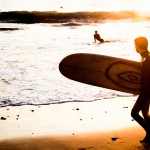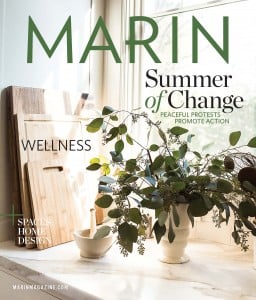Surfing During COVID-19: How to Be a Responsible and Eco-Friendly Surfer
Michael Stewart of Sustainable Surf discusses what wave riders should be doing during the pandemic.

In pre-virus times, Mill Valley resident Michael Stewart could be found at the beach with his family, talking to his friends at Proof Lab and maybe stopping by Hook Fish Co. to grab a taco and beer after a surf. As a lover of the ocean and outdoors, Michael wanted to be active in the fight against climate change, but most non-profits he encountered were only telling people about the problems, instead of offering opportunities to get more involved.
In 2011 he decided to use his experience in environmental consulting to found Sustainable Surf with partner Kevin Whilden. Their non-profit uses surf culture to encourage people to take an active approach to stopping climate change and restoring ocean health by adopting a sustainable lifestyle. Sustainable Surf empowers people to make positive changes through their many projects: Sea Trees, ECO board projects, Waste to Waves, Deep Blue events and Deep Blue Life.
We caught up with Michael to discuss this business and more importantly, his thoughts on what surfers should do during this pandemic.
What effect has COVID-19 had on the way you are approaching your business and your sustainability work?
At Sustainable Surf we have taken a step back and asked ourselves what can we do that will be of value to the community and our cause while being realistic about where the world is and what it will look like when the pandemic ends. As a surfer in the ocean, there are moments of uncertainty that may take you by surprise, like when a big wave is about to crash on top of you. At this time you don’t panic, because you know what you need to do to get out the other side; you duck dive and let the wave roll over.
We wanted to take this experience and create a community resource guide in the form of a weekly newsletter to help those who feel uneasy and powerless to take action and stay on track. As has already been seen during this pandemic, together we have the power to agree and make change happen. Our “Resurface. Stronger.Together” helps people at home take initiative and look into the future by offering opportunities through our programs and projects to contribute in a positive and powerful way. By getting the word out on environmental crises, like here on the coast where in the last few years we have lost 93% of our kelp forests, we can give guidance and offer the chance to directly take action and be part of the solution.
Do you think if people go surfing now that it jeopardizes the state’s efforts to keep people social distancing?
Though the water is one of easiest places to stay socially distanced, how much people are outside is the biggest factor for how long the quarantine will last, and will have an impact on the medical system. If you don’t have to be outside then try and stay in. If you are in a position where you don’t have to travel, like a resident close to a beach, then enjoy, but avoid traveling and coming in contact with other people to go surf.
How did you stay sane during the shelter-in-place mandate?
Like a lot of other people, I was able to take a step back from the craziness of traveling and producing events, and focus more on family. Learning to become a homeschool teacher for my daughter, while also juggling working from home has been a challenge, but I’m starting to get the hang of it. As a family we were able to enjoy the open space in Marin and I have been doing a lot of mountain bike riding. We live near Ring Mountain, and it was great to be able to go there and see the entire bay and city in a distance, it helped us feel connected.
Do you think the virus will have an impact on our approach to combating climate change? Do you think it’s taking away our focus, or do you foresee a potential productive outcome?
Right now the virus is on everyone’s mind, but during this pandemic we can’t forget that climate change hasn’t gone anywhere and we can’t lose any more time. Though we’ve seen some benefits from people staying home like air quality improvement, on the other side, NOAA just reported the biggest bleaching of the great barrier reef to date. It’s challenging to still talk about the health of our environment, but we can take advantage of the availability of people at home and encourage them to continue to support and take direct action. Our Sea Trees project, for example, allows people to take a part in the health of our coastal ecosystems by eliminating our carbon footprint simply by planting trees (from home).
How is the quarantine affecting your sustainably-focused lifestyle? How would you advise your audience to maintain a climate focus while in this situation?
During the last few weeks, I’ve taken this opportunity to slow down and be intentional about my actions. My family and I are staying home, supporting local business and staying aware of what’s going on in the community. It is a lesson on how we take the benefits that come from a time like this and make them into a teachable movement, like shifting to the “Deep Blue” Lifestyle.
Has your event business been affected? Any thoughts on when it will resume?
Larger events like the Red Bull Heavywater SUP race at Ocean Beach in San Francisco have all been put on hold, as well as our own fundraising event called ‘Patch the Planet‘ scheduled for June, that was bringing together fifty different artists and musicians doing conservation work to raise money to protect California’s giant kelp forests that had to be canceled. We won’t have clarity for a couple months on when we can have meetings with groups and, like most, we are trying to figure out how to best shift to the online space.
Will you be pivoting your business in any way because of the Coronavirus?
If you’re not pivoting your business to have it work under this new normal, you won’t be in business for much longer. For us this is really critical and we have found ourselves in a really interesting position, because our SeaTrees program and platform was designed from the start – to enable individuals and brands to support coastal ecosystem restoration projects remotely, from the comfort ( and safety ) of your mobile phone. Anyone can surf to the SeaTrees website right now to support planting mangrove trees, restoring kelp forests, and protecting holistic watersheds, as our local partners are still able to do the work on the ground.
Did anything change permanently during the last few months?
I think this isolation woke everyone up to the importance of community gathering places. The permanent change is realizing just how critical and important our freedom is to explore, meet up with friends and family.
Once the world returns to some type of normalcy, how can people get involved with Sustainable Surf?
We have a few options. SeaTrees is uniquely focused on direct action and allows people to balance their climate impact by planting, restoring and protecting our coastal ecosystems. The ECOBOARD Project unites the water-loving and board-riding community by creating a sustainable surfboard patent, ensuring the use of eco-friendly manufacturing practices and materials. Waste to Waves supports companies based in upcycling by aiding in the collection of foam, old wetsuits, and sails which are then turned into new surfboards, yoga mats and bags.
Deep Blue brands the idea of taking a solution to climate change past a surface issue and diving “deeper” into the business of behavior change and simple solutions. Deep Blue Events are ocean friendly events based on sustainability performance standards, focused on reducing environmental impact and providing social benefits for the community. Finally, Deep Blue Life looks at how we live our lives and makes small modifications that improve our carbon footprint. To fit into the deep blue lifestyle, people need to keep climate change present in their lives and not lose sight of doing our part. We have a critical call to action and we need to take action, whether it is planting trees with our sea trees program or using your dollar to support sustainable and local practices.
Conventional wetsuits have typically been made from neoprene, which is a non-renewable fossil fuel-based material, what are alternatives?
If you think about it, traditional wetsuits are gigantic pieces of solidified oil coming from non-renewable petroleum sources. There are a couple different alternatives such as limestone based rubber, which has been around for a little while and used by a number of companies. There is also a local company here in Marin called Feral wetsuits, they only sell online and has committed to planting one sea Sea Tree for every wetsuit sold. Patagonia makes a plant-based rubber wetsuit with a brand partner, called Yulex, available at Proof Lab which I think are pretty cool. Speaking of Proof Lab, they partner with one of our programs called Waste to Waves that turns old wetsuits and yoga mats into recycled wetsuits with our partners at Suga yoga mats.
Sunscreen? Is reef-safe a gimmick or is it important? Do you have any favorite brands?
Reef-safe is definitely not a gimmick at all, whether it is a coral reef or a rocky reef, if you slap on traditional sunscreen you are bringing your own private petroleum slick with you into the ocean. These slicks have disruptive characteristics that harm marine life and human health. Some brands I like are All Good, and Manda.
What are your favorite – not secret – spots to surf here in the Bay Area and why?
Just being at the beach grounds me and brings a smile out – so any place that is currently open is on my favorites list.
Read more on:
Surf’s Up: How a Chicago Surfer and Filmmaker is Helping Attract People to Lake Michigan’s South End
Local Business Set To Make 5 Million Masks for Healthcare Workers, MCF Funds First Order
The Health Benefits of Surfing




